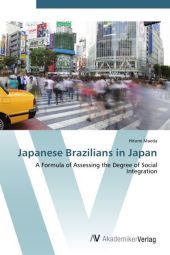 Neuerscheinungen 2012Stand: 2020-01-07 |
Schnellsuche
ISBN/Stichwort/Autor
|
Herderstraße 10
10625 Berlin
Tel.: 030 315 714 16
Fax 030 315 714 14
info@buchspektrum.de |

Hitomi Maeda
Japanese Brazilians in Japan
A Formula of Assessing the Degree of Social Integration
Aufl. 2012. 284 S. 220 mm
Verlag/Jahr: AV AKADEMIKERVERLAG 2012
ISBN: 3-639-41602-3 (3639416023) / 3-8364-2538-6 (3836425386)
Neue ISBN: 978-3-639-41602-2 (9783639416022) / 978-3-8364-2538-4 (9783836425384)
Preis und Lieferzeit: Bitte klicken
Revision with unchanged content. This book provides an overview of recent immigrant phenomenon in Japan and explains the complexity of the community integration of Japanese Brazilian offsprings, whose ancestors immigrated to Brazil about 100 years ago. Japan is relatively homogeneous society so that it is a great challenge for Japanese people to see differences and understand what really diversity or globalization mean. Through the research, life experiences and identity issues of Nikkei Brazilians, community integration, and factors that explain the degree of social integration of Nikkei Brazilians are explored based on the triangulated results from both quantitative and qualitative data. This study makes six basic contributions that are: 1) to reveal the perceptions of Nikkei Brazilians toward Japanese and vise versa; 2) to ascertain the major barriers influencing integration; 3) to empirically test and questioned several key hypotheses of previous literature; 4) to determine the special characteristics of this ethnic group in Japan; 5) to explore the possibility of developing a new theory going beyond conventional theories of assimilation, separation, marginalization, and integration and 6) to develop a formula for assessing the degree of social integration (SI index) based on an exploratory factor analysis.
Dr. Hitomi Maeda received her Ph.D. in Department of Educational Policy and Administration in University of Minnesota, USA; studies international education, intercultural communication, Teaching English as a Second Language, immigration issues, and minority education.


